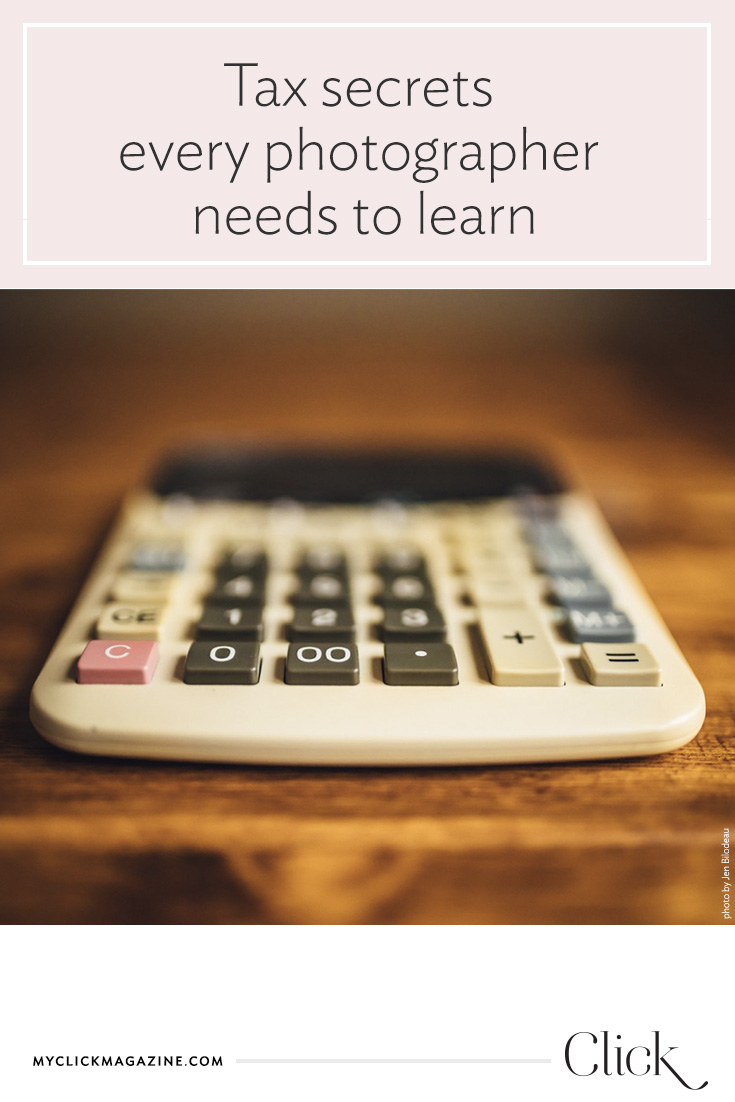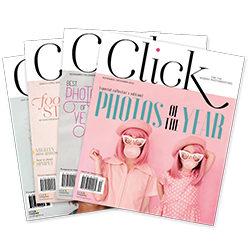Tax time can be intimidating for a photography business owner. We want to be sure we are following complex regulations properly, all while minimizing our tax burden as much as possible.
Knowing the basics and being prepared can take a lot of the stress out of all things taxes for your photography business. Here are some helpful tips that will enable you take tax season in stride.

What taxes?
If you are selling your images and services then you need to be paying taxes. There are several kinds of taxes that apply to small business owners: local and state taxes, federal taxes and self-employment tax.
Federal taxes are are paid annually, with estimated taxes paid quarterly. State and local taxes are set up through your state and are paid quarterly. Self-employment tax is what you must contribute to Social Security and Medicare. This is due annually when you final your federal tax return.
Let’s dive into each of these a bit further below.
Federal Taxes
Federal taxes are due by April 15th of the following year. How you file and pay your federal taxes will depend on your business structure. If you are a sole proprietor or a Limited Liability Company (LLC), you’ll file your business taxes at the same time you file your personal income tax return. Your business income and expenses are reported on the 1040 Schedule C.
If you are profitable and anticipate that you will owe taxes at the end of the year, you must file a 1040-ES with your estimated income tax payment quarterly. The government can penalize you if you wait until the end of the year to pay all of your taxes due. This “pay as you go” approach is also helpful so you don’t trick yourself into thinking you have more cash than you do.
Your accountant can help you calculate your estimated taxes. If you are calculating them on your own, just remember that if you are filing jointly with your spouse, the tax rate for your business will be the marginal tax rate for your combined family income.
State taxes
You will need to register your business to collect sales taxes in any state that you have a significant business presence in. Most business owners are registered in only one state, although someone living in Massachusetts, for example, may be registered in more than one state due to their proximity to state lines. Sales tax can be filed online very quickly and easily as long as your books are in order. It will take a few minutes to register initially, but most states let you link your business bank account to your sales tax account with the Department of Revenue which makes paying taxes in subsequent quarters relatively quick and painless. In most states, sales taxes are due within the first two weeks of the new quarter (April, July, October, January).
State tax rates and rules vary state by state (and, in some areas, even by city), so it is important to check with your Department of Revenue to ensure you fully understand your tax requirements. Sales tax rates vary from 0 to almost 8% depending on the states you operate in, and every state has different laws regarding sales tax, especially when it comes to the taxing of digital goods. Be sure to check your local requirements to ensure you are properly charging sales tax to your clients.
Self-Employment Tax
It’s important not to forget about the self-employment tax. Self-employment tax is 15.3% of your total pre-tax profit (12.4% for Social Security and 2.9% for Medicare). You will pay this tax when you file your federal tax return. The self-employment tax covers your portion of Medicare and Social Security. When you work for someone else, your employer pays half of this tax, but when you own your own business, you are responsible for the full 15.3%.
When filing your tax return, half of your self-employment tax paid is deducted as an adjustment against your gross income, however this does not affect the amount you must pay to the government. There is no way out of the 15.3% if you are self-employed.
Even if your business is part-time, and it may not even be your primary source of income, you still owe the government 15.3% of your pre-tax profits. As painful as this tax is, consider self-employment tax a cost of doing business and be sure to factor it into your rates and fees.
You might also like: Why I raised my prices: Learn how to charge what you need

What about hobbyists?
Even if you technically remain a hobbyist, you may take photography jobs from time to time for payment. Any money you earn from your hobby must still be reported as income on your federal tax return. It is considered “income from an activity not engaged in for profit.”
The IRS allows you to reduce this taxable income by deducting legitimate expenses that you incurred in connection with earning hobby income. Please note, however, that you are ONLY allowed to deduct expenses up to the amount of income that you had. Any expenses that exceed your hobby income are considered personal losses and are not deductible from your other income. To qualify for this deduction, you must itemize your deductions on your Schedule A: Itemized Deductions, rather than taking the standard deduction. Your accountant can help you with all of this.
Please also note that even if you consider yourself to be a hobbyist, you may be subject to state sales tax requirements. Please check your local guidelines.
You might also like: How to be a mom & photo business owner without totally losing it

Deductions and write-offs
It is important that you save the receipts for all of your business expenses so that they can be included in your business write-offs. If you are ever audited you will need those receipts to prove that your write-offs were legitimate business expenses.
If you haven’t already, it would help to have a separate business account so that the income and expenses for your business are not mixed in with your personal account. Having all of your payments and deductions for business in one place can save you a lot of time and hassle.
Commonly deductible expenses include:
- cost of goods (frames, printing, USBs)
- web hosting fees
- domain name registration
- photography seminars and workshops
- accountant fees
- business insurance
- sessions locations fees
- subscriptions
- advertising expenses
- contracted labor (second shooters and assistants)
- camera and computer gear and repairs
- mileage
- studio expenses
- supplies
Home office deduction
If you work out of your home you may also be entitled to a home office deduction. The home office deduction is designed to account for expenses such a mortgage interest, insurance, utilities, repairs and depreciation as they relate to your business. You can account for the home office deduction using either the simplified method (using a flat dollar value per square foot) or the regular method (actual expenses adjustment for the percentage of your home used for business). With either method, to claim a home office deduction, if audited, you must be able to show “regular and exclusive use” of the space (a multi-use office/homework space does not qualify), and “principal place of business.” It is still ok to conduct business outside of your home (at a session location or coffee shop), as long as your home office is the primary place you conduct business.
Meal deductions
The federal government also allows you to deduct meals that are considered “ordinary and necessary” to your business. An example would be meeting a client for coffee to talk about their upcoming session. On the other hand, grabbing a sandwich on your way home from a late photo shoot does not qualify as it does not meet the “ordinary and necessary” for your business test. When trying to determine if a meal is deductible, it must pass the “directly related test.” Ask yourself: Did you engage in business during the meal? Did you have more than a general expectation of getting some sort of business benefit out of the meeting?
You might also like: 5 Things to expect when you launch a photography business

Filing taxes
If you are going to do your own taxes, make sure you are comfortable working through the forms that are required for your business. Turbo Tax, or any similar program, is great and walks you through filing your state and federal taxes step by step.
Having tight and organized records is a must for filing your own tax return. You need to be able to categorize your expenses into the proper buckets and provide all of the necessary details on any equipment purchases you made during the year.
If you are not fully comfortable managing this on your own, it may be best to hire a tax professional. A professional will know exactly what you will need in order to file and what write-offs you can include.
Managing expenses
Even if you plan to work with a tax professional, you will still need to keep your business finances organized and ready to go for your annual filing. Keeping up with your bookkeeping throughout the year eases much of the burden of tax time.
There are many programs out there to help you stay organized. Studio management programs, such as 17 Hats, help you manage everything from client forms, to invoicing, to bookkeeping. Alternatively, you can elect to use a more finance-focused program such a QuickBooks. Even a homegrown Google sheet can work. All that truly matters is that you are organized and properly accounting for and categorizing all income and expenses that pass through your business.
You might also like: So you want to start a photography business?

Time to de-stress about photography business taxes.
Planning, filing and paying taxes for your photography business can feel scary, but with a little organization and planning, you’ll feel a lot more prepared when tax season rolls around. There are great resources and skilled professionals available to help you, and learning the basics will go a long way in taking the stress out of this time of year.
I’d love to hear your tax tips and advice in the comments!
Disclaimer: This article does not constitute financial or tax advice. The information contained herein is not a substitute for seeking financial advice from a tax advisor and may or may not be applicable to your specific situation, especially since tax laws vary by state.
All photos by Jen Bilodeau
More tips for running a successful business:
Running a photography business is hard work! Here are a few more articles we think you’ll enjoy—
5 Lessons I learned after I started my business
How to build a thriving photo business in a small community
4 Smart ways clients can help you improve your photography business
5 Social media marketing tips to grow your photography business
Your next photography client could be standing right next to you





This is a very helpful article! Thanks for all your insights.
Thanks for this post. Right after this, I am going to make an appointment with an accountant. I knew about state and federal taxes but I have not been factoring in self-employment tax! Thank you once again for the heads up.